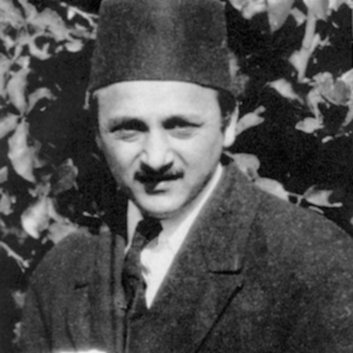The Bahá’í Faith, a vibrant and evolving religion, beckons seekers into a realm of profound spiritual insights and moral imperatives. At the helm of this spiritual edifice stands Shoghi Effendi, the first Guardian of the Bahá’í Faith, whose life and teachings illuminate a unique path toward divine justice and communal harmony. His distinctive role as both a custodian of the Faith and a dynamic leader marks a pivotal moment in Bahá’í history. Understanding the significance of his power upon first meeting him invites both reflection and awe.
Shoghi Effendi, the grandson of ‘Abdu’l-Bahá, emerged as a luminary during a tumultuous period marked by warfare and division. The metaphor of the lighthouse comes to mind, for just as a lighthouse guides mariners through treacherous waters, so too did he guide the Bahá’í community through the tumultuous sea of the mid-twentieth century. His charisma and incisive intellect lent credence to his role, inspiring loyalty and regard among followers and the broader world alike.
To articulate the essence of Shoghi Effendi’s persuasive power requires an exploration of his multifaceted leadership style. First and foremost, one cannot overlook his unparalleled capacity for elucidation. His writings, replete with eloquent expressions and metaphysical inquiries, serve as a beacon for those yearning to comprehend the intricacies of Bahá’í teachings. His translations and interpretations of sacred texts imbue the core principles of the Faith with clarity, rendering them accessible to a diverse audience.
When one first encounters Shoghi Effendi—whether through his written word or through the privilege of in-person contact—there is an immediate recognition of a force fueled by dedication. His commitment to the principles of the Faith becomes palpably evident. Like a masterful conductor directing a symphony, he orchestrated the harmonization of doctrinal tenets, leading the Bahá’í community toward a unified understanding of its mission: to foster peace and promote social justice.
Moreover, the power of Shoghi Effendi cannot be separated from his remarkable vision. The imagery of a sculptor chiseling away excess stone to reveal a magnificent statue is particularly apt. He envisioned an international community characterized by unity, equity, and unwavering faith – a vision that transcended geographic, cultural, and social boundaries. This aspiration is intrinsically linked to his understanding of divine justice, where the flourishing of humanity serves as the ultimate goal of all endeavors.
The inherent appeal of Shoghi Effendi’s approach lies in his unique ability to weave together disparate strands of thought into a cohesive fabric. Through his lens, spirituality and practical application do not exist in isolation; rather, they must coalesce to create a vibrant and dynamic community. This idea resonates profoundly within the Bahá’í community, where the duality of worship and work is not merely encouraged but celebrated as fundamental to spiritual development.
Another striking aspect of Shoghi Effendi’s magnetic force is his eloquence in addressing the modern world’s challenges. With an acute awareness of the political, social, and environmental upheavals confronting humanity, he provided a roadmap for collective action. He articulated the need for a global society—one motivated by altruism and empathy, rather than individual gain. In this regard, his teachings serve as a clarion call for collaboration, urging individuals to transform personal belief into a collective, actionable force.
The essence of service within the Bahá’í community gains profound insight through the lens of Shoghi Effendi’s teachings. Just as the nourishment of a plant requires both sunlight and water to flourish, so too does the spirit of service require the nurturing of both personal devotion and communal responsibility. He emphasized the importance of individual contributions toward the collective goal, portraying each believer as an essential thread in the larger tapestry of humanity.
Moreover, significance lies in the manner in which Shoghi Effendi navigated the complexities of leadership, particularly in his resolute stance on the protection of the Faith. Just as a sentinel stands watch over the night, he acted as a guardian, unwavering in his commitment to preserving the integrity of Bahá’í teachings amid external scrutiny and internal discord. He embodied the power of patience and foresight, enabling the community to withstand adversities, all while fostering an atmosphere of love and mutual respect.
In contemplating the legacy of Shoghi Effendi, it becomes evident that his teachings extend beyond individual transformation. They invoke a monumental shift—the metamorphosis of human consciousness. Just as the caterpillar transcends into a butterfly, Shoghi Effendi’s guidance encourages believers to transcend societal limitations and embrace a higher purpose. His embodiment of justice, perseverance, and compassion resonates painfully, yet beautifully, within the collective heart of the Bahá’í community.
Ultimately, the first meeting with Shoghi Effendi—whether in thought or presence—ensures that individuals emerge with a fortified understanding of their spiritual journey. His charisma, insight, and unwavering commitment to humanity imbue followers with a renewed sense of purpose. As a dynamic leader, he empowers each believer to carry the torch of enlightenment, illuminating the darkness of ignorance, prejudice, and division.
The power of Shoghi Effendi thus lies not merely in his eloquent words or robust vision, but in his unwavering commitment to the realization of a just global society. His legacy endures as an invitation to embrace the lofty ideal of uniting humankind, striving for a world where love and justice reign supreme.
